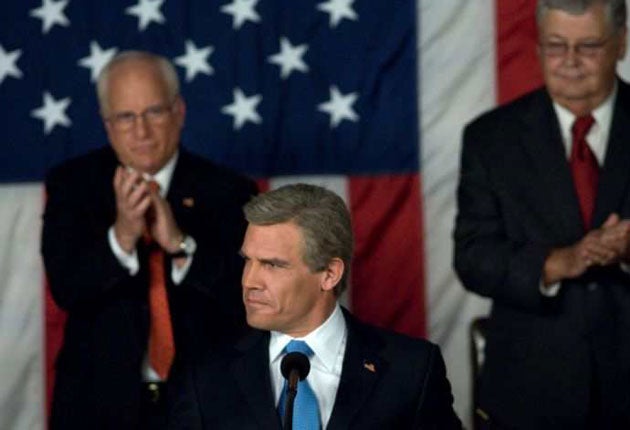W, Oliver Stone, 129 mins, 15
Josh Brolin has a good stab at rendering President Bush as complex. But the film comes too late to be useful, too early to dish the dirt

Oliver Stone's latest film ends, pointedly, with the words "The End" – this in a week when Americans and America-watchers were thinking about a beginning. There are now far more pressing and heartening matters to preoccupy the world than George W Bush and W, Stone's dramatisation of the outgoing president's wayward life.
W is a film that has come too late, and too early. Too late because, if someone had made a truly swingeing, finger-pointing film about Bush before now, it might have done a lot of good. But then, it probably couldn't have happened; by all accounts, it was hard enough for Stone to make this comparatively benign piece while its subject was in power. If, however, he had waited a few years to gain historical perspective, he might really have illuminated the scandal of Bush's presidency. As it is, we get a soft-edged cartoon that is neither that trenchant nor that funny. W is as much of the moment as a year-old New Yorker yellowing in a dentist's waiting room.
Stone portrays George W (Josh Brolin) as an aggrieved eternal adolescent desperate to win his father's approval: this is a Freudian drama that, rather than derides its subject, joshes him gently but ultimately is compassionate and understanding towards him. And if you can see any point, artistic or moral, in extending compassion to George W Bush, you might appreciate this film more than I did.
Stone and writer Stanley Weiser interweave the White House tenure with scenes from Bush's apprenticeship, showing how a feckless rich boy came to occupy the most elevated and dangerous post on earth. Young Dubya's progress is the meat of the film, especially in his scenes with George Snr, a humane but forbidding patrician played with impeccable loftiness by James Cromwell: cameraman Phedon Papamichael makes a point of shooting the pair so that Bush Snr towers imposingly over his son. This is a relationship based on Shock and Awe: son feels awe, father observes him with shock. Junior's motivations are oedipal from the start: we first see young George at a Yale frat house hazing ceremony, where he eagerly tries to please the alpha males of Delta Kappa; he then staggers out of a drunk tank to take a call from Dad, enthusing about the old boy's sporting prowess before getting the paternal book thrown at him. Even when he belatedly displays some gumption, his parents can't believe in him: "Governor of Texas!" snorts mother Barbara (Ellen Burstyn), when he reveals his ambitions. "You must be joking!"
The film offers a few telling insights into the making of the public persona: beaten to Congress by a Democrat who calls him a slick Easterner, George W seethes, "There's no way I'll ever be out-Texaned or out-Christianed again" – and darnit if he wasn't true to his word. But there's little lampooning of the Saturday Night Live variety: in the more comic scenes, Dubya, for all his gaffes, comes off more like a wise fool than a mere dullard. But oh how the film creaks in the run-up to Iraq. In an extended, grindingly lifeless scene, Colin Powell (Jeffrey Wright) stands as the voice of sanity as he tries to hold Bush back from war, only to be silenced by Dick Cheney (a sly, savoury Richard Dreyfuss). "Control Iran, control Eurasia, control the world! Empire – real Empire!" snarls Cheney, practically jabbing the air with the point of his forked tail.
A-grade supporting players perfectly catch the tone of the inner circle: Toby Jones is an affably crafty Karl Rove and Scott Glenn a desiccated Rumsfeld, although Thandie Newton's Condoleezza Rice has little to do but wince sourly till late in the film, when her nervy staccato cadences kick in uncannily. Stacy Keach steals the show as the preacher who gets Dubya on the Jesus team; even he looks nervous when his acolyte starts spouting about divine calling.
W's one cast-iron asset is Josh Brolin, who achieves the impossible: turning the public cartoon into a complex human being. Inevitably, we start off seeing Bush as a loping, lunkish caricature: it's what we're used to. But as Brolin progresses through the ages of W – eager jock, slackass barfly, peevish middle-aged teenager – he carries real emotional heft, even in the borderline-cute scenes between George and his adoring Laura (Elizabeth Banks). Giving Bush a stolid, vulnerable warmth, Brolin makes you see why Laura falls for, then sticks by him.
Brolin on the podium is uncannily like the President we know: the misplaced inflections, the dogmatic overassertion, the inappropriate good-ol'-boy bonhomie, and that narrowing of the eyes as he says "al-Qa'ida". Yet Brolin can't hide the candour of his own muscular physiognomy: what's missing is the sheer dead-eyed belligerence of Bush's simian gaze.
W lacks the rage without which a Bush movie, now at least, is inconceivable. The film comes across as a tragicomedy about what happens when a mediocrity gets out of his depth. It doesn't hammer Bush personally for the iniquities of his regime: Guantanamo is relegated to one jokey line. Well, Stone clearly had his reasons for not making that film, the one we would have expected of him. But neither has he made the George W Bush film that the world needed. Still, we can breathe a sigh of relief that Stone won't have to make a Sarah Palin movie next.
Join our commenting forum
Join thought-provoking conversations, follow other Independent readers and see their replies
Comments
Bookmark popover
Removed from bookmarks